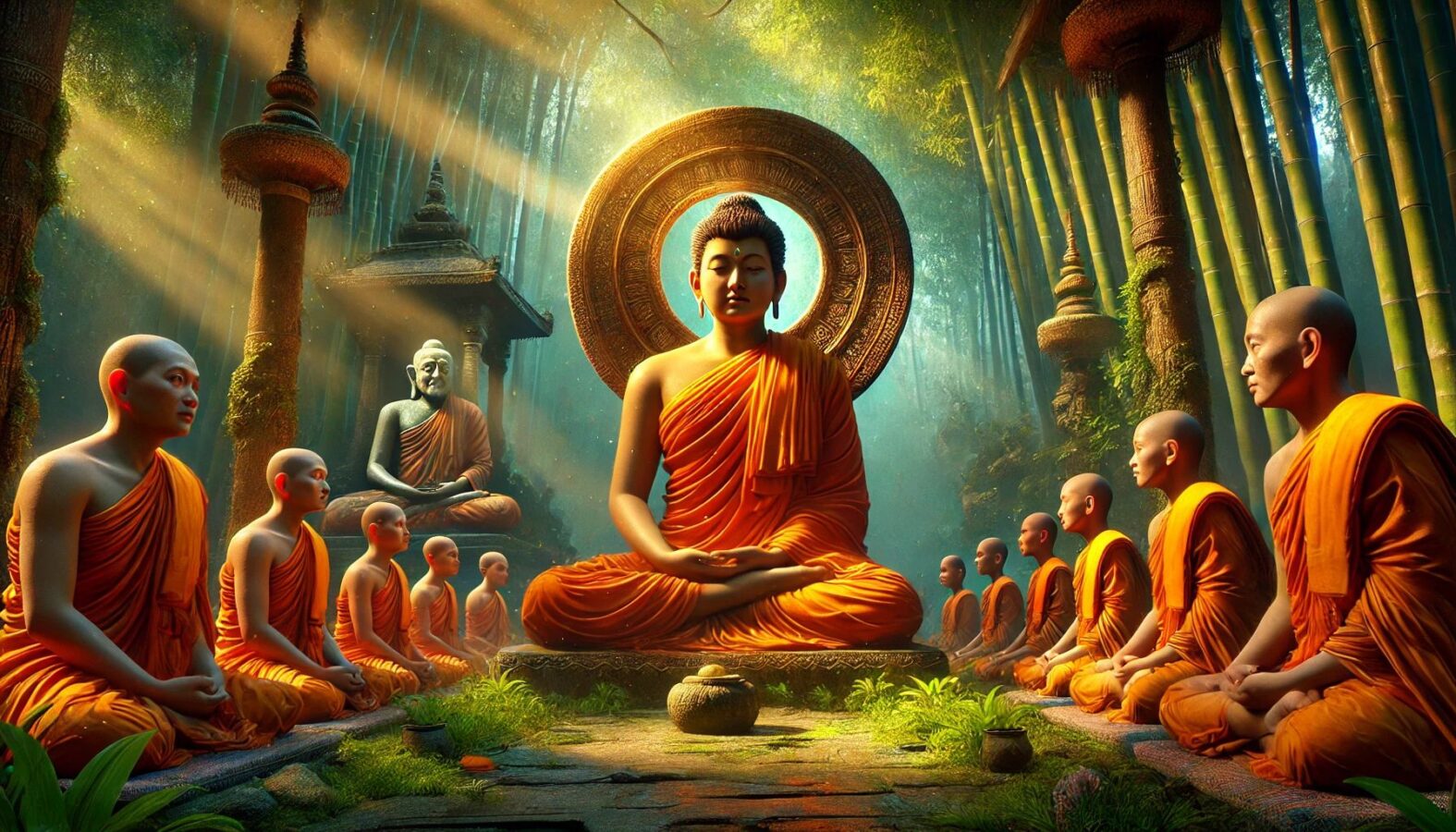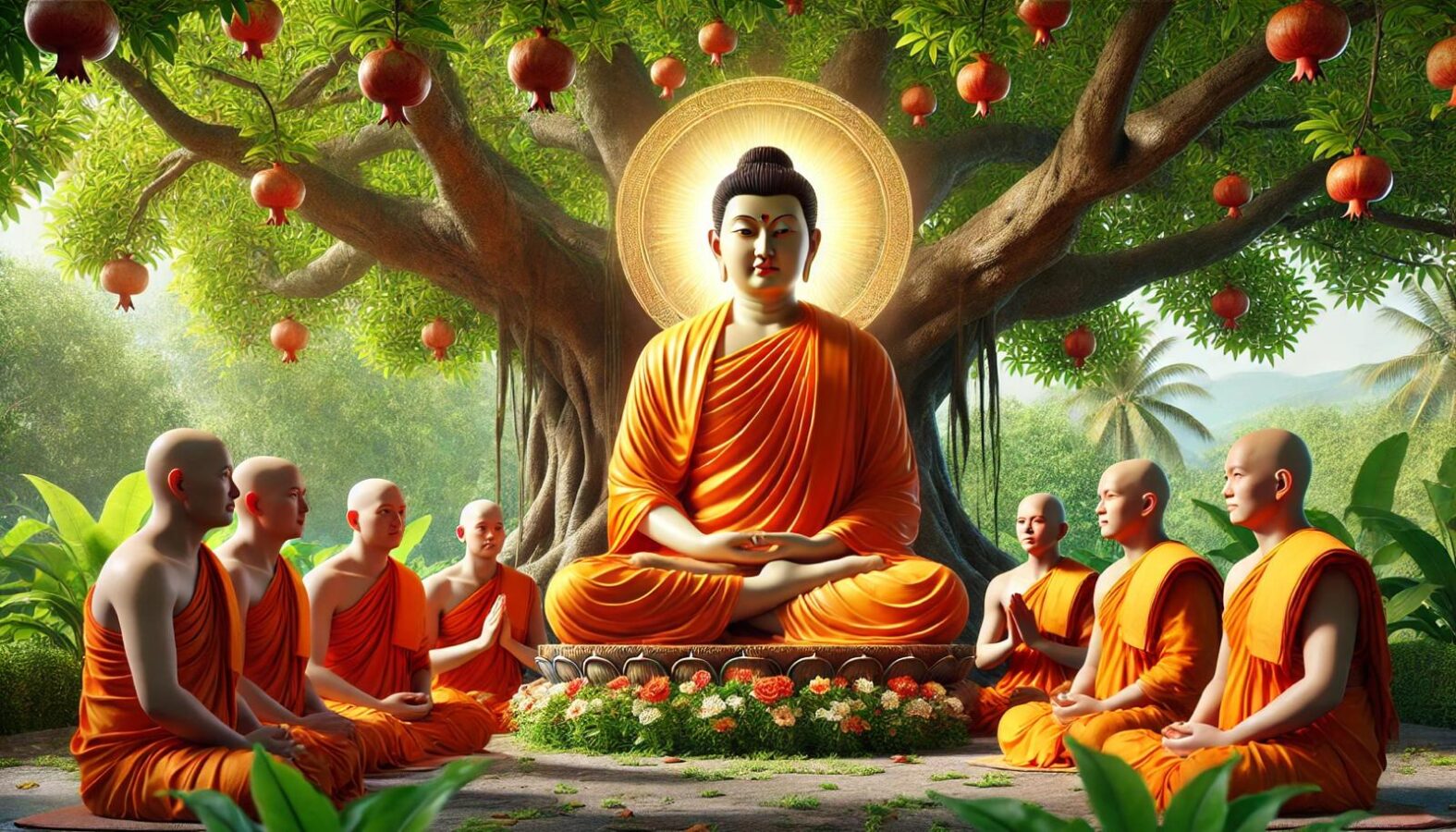
Date: 07/19/2025 07/20/2025
Location: Star River Meditation Center
Teacher: Yunquan Huang
Dharma Talk
Śāriputra, Foremost in Wisdom
Śāriputra was one of the ten great disciples of the Blessed One. Whenever the Buddha expounded the Dharma, Śāriputra would always be by his side.
Śāriputra was also known as Śāriputtra. His mother’s name was Śāri, and “puttra” means “son”; thus, Śāriputtra means “the son of Śāri.”
Initially, Śāriputra adhered to another religious sect and was followed by a retinue of one hundred disciples. After a period of cultivation, he felt inwardly lost and directionless, unable to grasp the true meaning of life. While he was in this state of confusion and distress, he happened upon the Venerable Assaji, one of the first five monks to take refuge in the Buddha. Venerable Assaji’s noble demeanor and dignified conduct deeply impressed Śāriputra, who immediately approached and asked him for the Dharma.
Hearing from Assaji the words of the Buddha and his teachings was like thunder breaking the heavens. The doubts that had long clouded Śāriputra’s heart regarding the universe and life were utterly dispelled. He resolved to seek out the Buddha and made a firm agreement with Assaji to visit him together.
Upon returning to his abode, Śāriputra relayed to his close friend Mahāmaudgalyāyana what he had heard from Assaji about the Buddha and his Dharma. As Śāriputra spoke, he himself was moved to the point of tears, and Mahāmaudgalyāyana, too, was profoundly touched and wept.
The next day, Śāriputra and Mahāmaudgalyāyana led two hundred disciples to the Bamboo Grove Monastery and took refuge at the feet of the Buddha. There, they felt they had finally found their true teacher.
The Āgama Sutras state:
“Infinite in wisdom, dispeller of doubt—such is the Bhikkhu Śāriputra.”
Among all the disciples, Śāriputra was known as the foremost in wisdom.
The Mahāprajñāpāramitā Śāstra likens Śāriputra to a venomous snake whose will is unwavering across lifetimes. The Buddha once told of a king who was bitten by a poisonous serpent and lay on the brink of death. Physicians said that the only cure was for the very serpent to suck out the poison from the wound. A blazing fire was prepared, and the snake was told: suck out the venom or be thrown into the flames. The serpent, however, refused to violate its nature, choosing death in fire rather than submission. Just so, Śāriputra, once he had resolved upon a principle, would never turn back—not even if consumed by fire. Truly, he was one of indomitable will.
Another well-known story about Śāriputra appears in the scriptures:
Though Śāriputra had attained the Arhatship of the Hīnayāna path, he later realized that the lesser vehicle served primarily for self-liberation, seeking only personal deliverance from birth and death. Reflecting that the bodhisattva path, which seeks to liberate and benefit all beings, was far more virtuous, he gave rise to the Great Aspiration—to practice the bodhisattva path and relieve all beings of their suffering. As the sutras say:
“Not seeking happiness for oneself, but wishing only that beings be free from suffering.”
He resolved to embody this altruistic spirit of the bodhisattvas.
Moved by this great vow, a celestial being—possessing knowledge of others’ thoughts—decided to test him. The deva descended from the heavens, assuming the form of a grieving son, and sat weeping bitterly by the roadside.
Seeing this, Śāriputra’s heart was filled with compassion. He asked:
“Young man, why are you in such sorrow? I am one who walks the path of the bodhisattva. If you are in trouble, please tell me. I shall do all I can to help.”
The youth replied:
“It’s no use telling you. You wouldn’t be able to do it.”
Śāriputra said:
“Do not hesitate. Tell me. If it is within my ability, I will surely help you.”
Hearing this sincerity, the youth cried all the more, and finally said:
“Alas! My mother is gravely ill. The physician has prescribed a strange remedy—not just any medicine, but the eye of a cultivator. Who would ever be willing to give up their own eye? I must simply watch my mother perish. How could I not be in pain?”
Śāriputra replied:
“Think of a way! Though this may seem impossible, the Blessed One has said:
‘To attain Buddhahood, one must pass through three great asamkhyeya kalpas of cultivation, and even relinquish one’s head, eyes, brain, and marrow.’
If you need an eye, then I shall give it to you.”
Having resolved thus, Śāriputra plucked out his left eye and offered it, saying:
“Young man, take this to heal your mother.”
But the youth cried out:
“Wait! I haven’t finished speaking! The doctor said it must be the right eye, not the left. You’ve made a mistake!”
Hearing this, Śāriputra’s heart sank. But then he recollected his vow:
“Since I have taken the bodhisattva path, I must go through to the end.”
And so, he bore the pain and tore out his right eye to offer as well.
Now blind, he handed both eyes to the youth. The youth sniffed them and said:
“Ugh! These eyes stink horribly!”
Then he added:
“They say a true cultivator’s eyes should smell fragrant. Yours reek! How could my mother ingest such filth?”
Saying thus, he flung the eyes to the ground and crushed them beneath his heel.
Though Śāriputra could not see, he could hear what was happening. His heart felt as shattered as his eyes. He sighed and said:
“Beings are truly difficult to save. To be a bodhisattva is no easy task. I gave up both my eyes, and still he complains of the stench. Ah, I will no longer seek the bodhisattva path. I shall return to the Hīnayāna—to seek only my own deliverance.”
At that moment, the deva revealed his true form and exclaimed:
“O Venerable Śāriputra! You are truly noble! Your compassion for beings is vast and sincere. The Buddhas and the devas shall protect you. Your eyes shall be restored!”
At once, Śāriputra’s vision was miraculously restored. He renewed his great vow and continued on the path of the bodhisattva.
Among the ten principal disciples of the Buddha, Śāriputra was praised as foremost in wisdom, for his deep and vast understanding of the Dharma, and for his supreme ability to guide others on the path to liberation, second only to the Buddha himself.
Although the Buddhist scriptures contain no complete biography of Śāriputra, scattered accounts throughout the sūtras and śāstras provide glimpses into his life. He was deeply intertwined with the life of the Buddha and the saṅgha, playing a pivotal role. In many assemblies, he acted as a leader—gentle and skillful in teaching, an excellent model, kind and considerate, a protector of the community, and a faithful preserver of the Buddha’s teaching. For these qualities, he earned the revered title Dhamma-senāpati, Commander of the Dharma.
Śāriputra, with profound wisdom and noble character, was indeed a true disciple of the Buddha.

